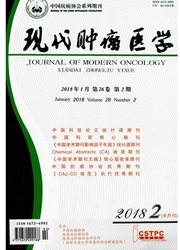

 中文摘要:
中文摘要:
目的:探讨整合素β3蛋白的表达水平与乳腺癌患者预后的关系。方法:应用免疫组织化学染色法检测129例乳腺癌标本中整合素β3蛋白的表达,分析整合素β3表达与乳腺癌临床病理因素及预后的关系。结果:整合素β3蛋白表达与患者年龄、绝经状态、组织学分级及孕激素受体密切相关。整合素β3阳性乳腺癌患者无病生存时间及5年总生存时间显著差于整合素β3阴性者。腋下淋巴结阴性乳腺癌患者,整合素β3阳性患者与阴性患者比较其预后显著不良。Cox多因素分析显示整合素β3是乳腺癌预后不良的独立危险因素。结论:对于乳腺癌患者,整合素β3表达增高提示预后不良,整合素β3可成为判断乳腺癌预后的重要指标。
 英文摘要:
英文摘要:
Objective: To explore the significance of integrinβ3 expression in breast cancer. Methods: Immunohistochemical staining was used to detect integrinβ3 expression in patients with breast cancer and compared with the clinicopathological features. Results: Expression of integrinβ3 was associated with age,menopausal status,histologic grade and PR. Breast cancer patients with positive integrinβ3 expression had significantly lower DFS and 5- year survival rate than patients with negative integrinβ3 expression. In addition,for node- negative breast cancer,positive integrinβ3 expression indicated markedly unfavorable survival rate than negative ones. Multivariate analysis confirmed that integrinβ3 expression was an independent unfavorable prognostic factor for patients with breast cancer. Conclusion: Integrinβ3 expression indicated poor survival rate for patients with breast cancer. Integrinβ3 expression is a new,important risk factor for breast cancer recurrence.
 同期刊论文项目
同期刊论文项目
 同项目期刊论文
同项目期刊论文
 期刊信息
期刊信息
